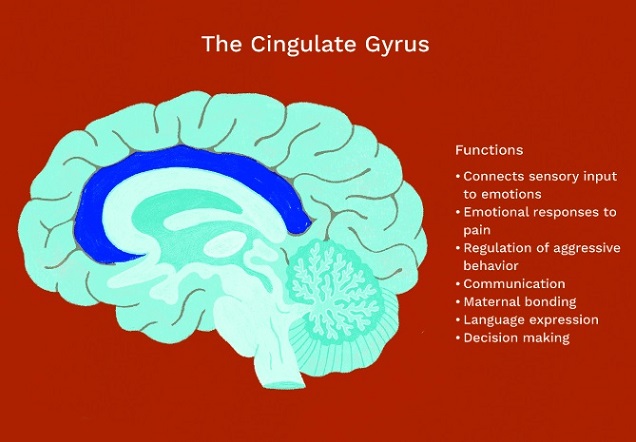Russian Scientists Discover That COVID-19 Causes Biochemical Changes in the Brain’s Cingulate Gyrus
Nikhil Prasad Fact checked by:Thailand Medical News Team Jan 08, 2025 3 months, 1 week, 8 hours, 53 minutes ago
Medical News: Researchers from Pavlov First Saint Petersburg State Medical University in Russia have made a groundbreaking discovery about the neurological effects of COVID-19. Their study reveals that patients suffering from post-COVID syndrome exhibit significant biochemical changes in the cingulate gyrus, a critical region of the brain associated with emotions, behavior, and cognitive functions. This finding sheds new light on the lingering effects of COVID-19 and provides crucial insights into understanding post-COVID cognitive impairments.
 Russian Scientists Discover That COVID-19 Causes Biochemical Changes in the Brain’s Cingulate Gyrus
The Cingulate Gyrus: A Vital Brain Region
Russian Scientists Discover That COVID-19 Causes Biochemical Changes in the Brain’s Cingulate Gyrus
The Cingulate Gyrus: A Vital Brain Region
The cingulate gyrus is part of the limbic system, located on the medial side of the cerebral hemisphere. It plays a crucial role in emotional regulation, decision-making, and linking sensory inputs to behavioral responses. The anterior cingulate cortex, for instance, is involved in processing emotions and connecting reward and punishment signals to actions. Damage or dysfunction in this region has been associated with a wide range of cognitive and psychological impairments.
COVID-19 and Cognitive Impairments
Post-COVID syndrome, characterized by lingering symptoms after the acute phase of the disease, includes cognitive impairments in 33 - 60% of patients. These impairments often lead to challenges in daily life, such as memory issues, reduced ability to concentrate, and emotional instability. Non-invasive MR-spectroscopy techniques were used in this study to assess the metabolic state of the cingulate gyrus in patients with post-COVID syndrome, providing a deeper understanding of the biochemical disruptions caused by the virus.
This
Medical News report explores the biochemical changes that were uncovered in this vital brain region and how these changes correlate with the clinical symptoms observed in post-COVID patients.
Key Findings: Altered Metabolite Levels
The study identified several significant changes in metabolite levels within subregions of the cingulate gyrus.
-N-Acetyl Aspartate (NAA): Decreased levels of NAA, a key marker of neuronal health, were observed in the subregions of the cingulate gyrus. This decline correlated with the severity of cognitive impairments measured through clinical scales.
-Glutathione (GSH): A reduction in GSH, a critical antioxidant, was noted in the midcingulate and posterior cingulate cortices. This indicates oxidative stress and damage to neuronal cells.
-Creatine (Cr) Fractions and Lactate (Lac): A diffuse decrease in Cr fractions, coupled with the presence of lactate, suggested energy deprivation in neurons.
-Posterior Cingulate Gyrus: This region showed the most significant metabolic abnormalities. In addition to reduced levels
of NAA, Cr, and GSH, there were elevated lipid fractions and decreased glutamate (Glu), a neurotransmitter essential for cognitive functions.
The researchers concluded that the biochemical disruptions in these metabolites are largely responsible for the wide range of symptoms associated with post-COVID syndrome, including cognitive impairments, emotional instability, and fatigue.
Implications for Diagnosis and Treatment
The findings emphasize the importance of the cingulate gyrus in the spectrum of post-COVID symptoms. The study advocates the integration of artificial intelligence in identifying these metabolic abnormalities more efficiently. This advancement could enhance the accuracy and speed of diagnosing post-COVID syndrome and guide the development of targeted treatments.
Conclusions
The study highlighted substantial biochemical hypofunction in all subregions of the cingulate gyrus in patients with post-COVID syndrome. The diversity of functions performed by this brain structure explains the range of clinical symptoms, from cognitive and emotional disturbances to physical fatigue. These findings underline the necessity of focusing on neurological health in the long-term management of COVID-19 survivors.
The study findings were published in the peer-reviewed journal: The European Physical Journal Special Topics
https://link.springer.com/article/10.1140/epjs/s11734-024-01444-4
For the latest Long COVId-19 News, keep on logging to Thailand
Medical News.
Read Also:
https://www.thailandmedical.news/news/folate-deficiency-aggravates-covid-19-impacts-on-brain-health
https://www.thailandmedical.news/news/neuroinflammation-and-new-strategies-for-brain-health
https://www.thailandmedical.news/news/researchers-warn-that-next-global-pandemic-could-possibly-involve-a-virus-that-targets-the-brain
